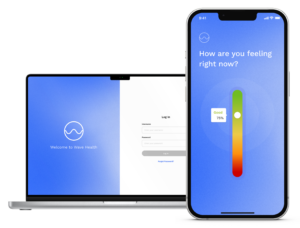Overall summary
Prostate cancer is the most common cancer in men with more than 52,000 new diagnoses every year on average in the UK. Support for men post diagnosis includes managing side-effects (physical, sexual, emotional) which may be life-long and impact on day-to-day life, resulting in a reduction in quality of life.
A collaboration between Health Innovation Oxford & Thames Valley (HIOTV), Treatment Technology Insights (TTI) and Bayer is focussing on a digital platform and application to enable self-supported management for patients with prostate cancer. The Wave Health mobile app enables patients to track their symptoms, side effects, medications, activities, and other lifestyle factors outside of the clinical setting. The contextual data is correlated to provide personalised insights that drive patient health literacy and supported self-management. The connected care portal allows healthcare professionals to remotely monitor larger patient cohorts and prioritise those most in need based on risk stratification.
HIOTV conducted a feasibility study and engaged with key stakeholders in the NHS clinical pathway following diagnosis of prostate cancer to assess the clinical need, perceived potential benefits, acceptability and barriers to adoption of the app.
 What is the challenge?
What is the challenge?
Prostate cancer is a condition that has variable treatment and management plans, resulting in different patient pathways dependant on the patient’s choice of intervention and type/severity of prostate cancer. Clinical management of this increasing number of patients and providing the level of support to patients for self-management of their condition has become difficult on strained NHS resources. The NHS Long Term Plan is committed to rolling out ‘supported self-management’ to provide personalised care and empower patients to manage their ongoing conditions.
What did we do?
HIOTV performed a feasibility study using the lean assessment process (LAP) methodology to gain insights into the perceived usefulness, potential clinical benefits, acceptability and barriers to adoption of the platform. Fifteen key clinical and commissioning stakeholders working in the post-diagnosis prostate cancer pathway across seven NHS Trusts were interviewed according to the LAP methodology. Responses were thematically analysed and combined with human factor tools to provide a comprehensive report on the platform’s potential utility and benefit.
What has been achieved
The feasibility study highlighted the platform as a significant advancement in clinical practice for prostate cancer management in the post-diagnosis clinical pathway. Stakeholders acknowledged the unmet need for a platform of this kind and recognised the application’s potential to enhance clinical efficiencies (notably in reducing administrative workload and improving patient-centred care). Additionally, the feasibility study found that Wave Health could potentially lead to more efficient patient triage, robust stratified follow-up, increased communication between patients and clinicians and reduction in unplanned GP and hospital visits due to mitigation of complications and adverse events. Stakeholders also highlighted the importance of having robust data regarding the health economic benefits of Wave Health, emphasising the need for future evidence generation particularly through real-world health economic studies.
What people said
“We are honoured to be working with such impactful oncology thought leaders in the UK to help alleviate NHS capacity burdens, while also improving patient health literacy, outcomes, and quality of life, starting with prostate cancer.” – Matt Lashey, TTI CEO
What next?
The first site for a pilot at an NHS Trust is being explored. Data and metrics collected before, during and after implementation will be analysed to understand the impact of the new service model will be for any future commissioning of the platform.
Contact
Lauren Hudson, Project Manager lauren.hudson@healthinnovationoxford.org

